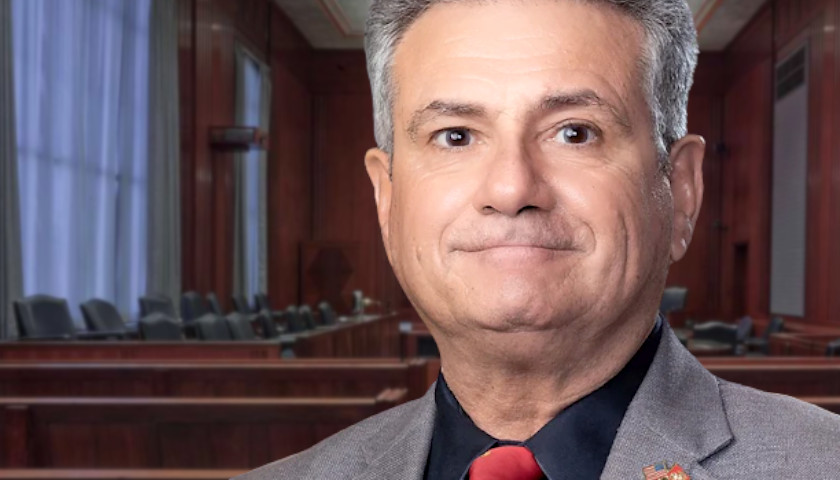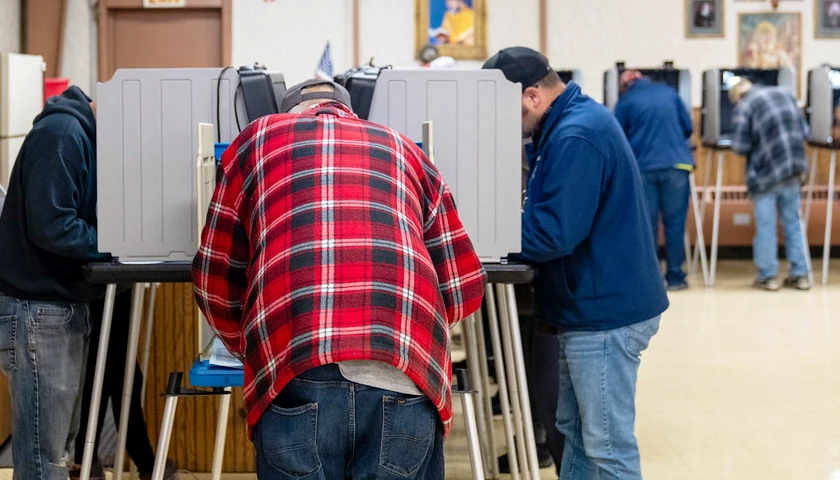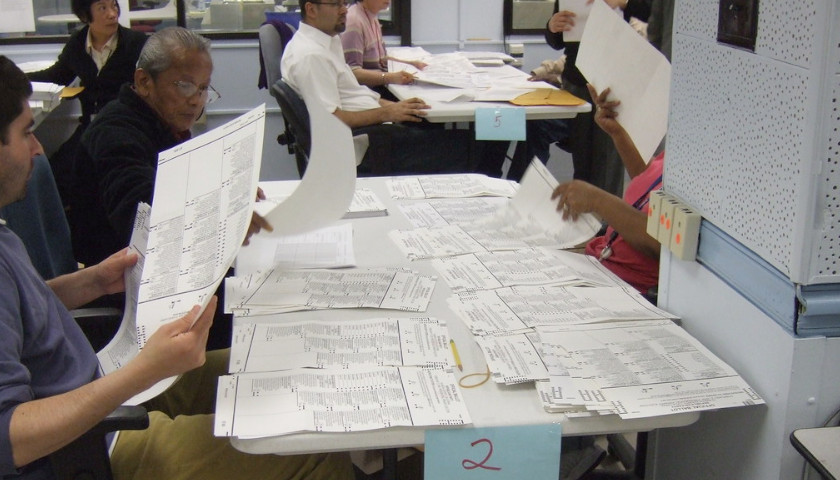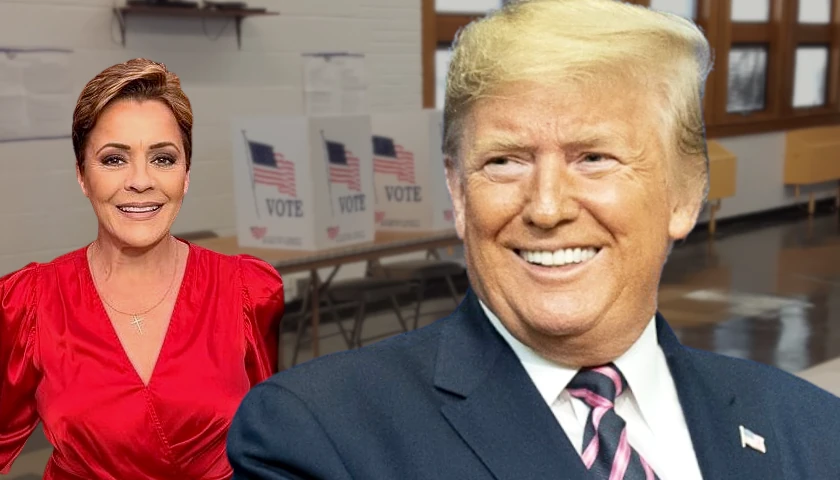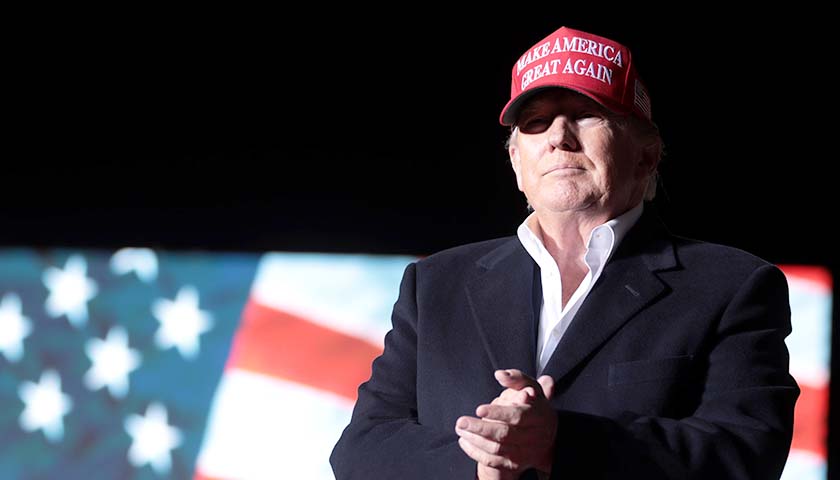Candidates and other interested parties have started filing lawsuits contesting the election results in Arizona, particularly in Maricopa County, where 59 percent of the vote centers were plagued with ballot tabulation problems, causing long lines in heavily Republican areas forcing some voters to leave without voting. One of those lawsuits was filed on Monday by State Senator Sonny Borrelli (R-Lake Havasu), challenging the use of AI to verify signatures, which Arizona Attorney General Mark Brnovich has stated is illegal.
Attorneys for the election integrity organization True the Vote drafted the complaint. It asserted, “Maricopa County ran 1.3 million images, on monitors, past the eyes of a few dozen of its Signature Verifiers at such a rapid clip that it was physically impossible for them to verify the Delegated Software’s adjudications about those images reliably.” True the Vote founder Catherine Engelbrecht told The Arizona Sun Times, “Many voters in Mohave County reported concern that their votes were being diluted by events in Maricopa County. We listened, retained counsel, and got to work. This litigation seeks to uncover the source of their concerns. We look forward to seeing it tried in court.”
Filed in Mohave County Superior Court and naming Secretary of State Katie Hobbs, the Maricopa County Supervisors, and Maricopa County Recorder Stephen Richer as defendants, the lawsuit also represents Mohave County voters. It seeks to nullify the gubernatorial election results. It included exhibits containing emails and contracts between Maricopa County Elections employees and third-party vendor Runbeck Election Services arranging to use AI for signature verification. Earlier this year, an attorney for Maricopa County admitted AI is used for signature verification, prompting concern by Arizona Attorney General Mark Brnovich.
The complaint stated that the county “failed to set standards or provide guidance of any sort for (1) adjustments that might be made to the Delegated Software’s settings during the ballot count, (2) recruiting and hiring people tasked with operating the software (‘the Signature Verifiers’), (3) adequate training for the Signature Verifiers, (4) reliable back-up systems, or (5) mechanisms for appeal or review of rejected ballot signatures.” The complaint said this led to a large number of mail-in and drop box ballots that were “counted when they should not have passed a proper verification system, thereby diluting the voting strength of voters in other counties, including Mohave County.”
The lawsuit discussed how AI can have “inevitable, often unconscious cognitive biases” due to human programming, citing Amazon’s AI recruitment that favored hiring white males, facial recognition systems performing more accurately on lighter-skinned faces, and Microsoft’s Tay Twitter chatbot learning conversational skills from trolls that taught it to say repugnant things.
The complaint explained how the Verus Pro software used by Runbeck to verify signatures creates a “confidence score” for each signature match. “It is beyond the limits of human nature for these Signature Verifiers not to be influenced by the seemingly authoritative, but actually opaque and unproven, conclusions of the Delegated Software,” the complaint contends.
A.R.S. 16-550(A) does not authorize the use of AI for signature verification. It states in part, “Except for early ballots tabulated as prescribed in section 16-579.02, on receipt of the envelope containing the early ballot and the ballot affidavit, the county recorder or other officer in charge of elections shall compare the signatures thereon with the signature of the elector on the elector’s registration record.” Additionally, the complaint objected to Runbeck’s involvement at all, “Nothing in Arizona election laws authorizes a county to outsource signature verification to a non-government third party.” The State Election Procedures Manual doesn’t contain any authorization for Runbeck either.
The Runbeck family contributes to Democrats. Robyn Runbeck, the wife of owner Kevin Runbeck was a donor to the “Stop Republicans” PAC. Runbeck also provides election services in Ge0rgia.
The complaint cited Miller v. Picacho Elementary School, where the court found that “the absentee ballots counted in violation of A.R.S. section 16-550(A) indisputably change[] the outcome of the election.” Since Mohave County did not use AI for signature verification, the complaint argued this disenfranchised that county’s voters.
The complaint included exhibits containing emails from senior Maricopa County Elections official Rey Valenzuela to Runbeck employees, warning them that Verus Pro was not ready to be used for the 2020 general election. He said, “Excuse my French but this sh** show needs to be improved on post haste from RES side. … WE NEED A WORKAROUND NOW so that Signature Verification can be done now without harming our staff. Again, I am regretting my decision to proceed with using Verus Pro for the General and to be proven wrong that we won’t have any issues, and to put my name to that decision and have it be a first file issue is beyond frustrating. So again, we need a work around and remove Verus Pro from the equation so we can work the files.” The county still went ahead and used the software.
There were 1,311,734 mail-in or drop-off ballots that were affected by the AI adjudication, the complaint asserted, which likely affected the outcome of the gubernatorial race since Kari Lake lost by only 17,116 votes to Katie Hobbs. The complaint stated that the margin of error in the software is at least 3 percent, which is “39,352 falsely accepted signatures,” more than twice the margin of victory.
Perhaps due to changing signature verification standards significantly, ‘bad’ signatures were rejected 14 times more often during the August primary election in Maricopa County than during the 2020 General Election.
Signature verification software like Runbeck’s Verus Pro Automated Signature Verification, which is also used in Nevada, can be adjusted to allow for very loose matching. In that state, a journalist tested the AI signature verification system and found an 89% failure rate. He did it by having nine voters sign their names on the return envelopes copying his handwriting, not using their own (this didn’t violate any laws). Eight of the nine ballots were accepted.
Mohave County initially delayed certification of the election results, but after the Mohave County Supervisors were threatened with arrest and prosecution, Chair Ron Gould said he “had no choice but to vote Aye.” A hearing has been set for Friday in Mohave County Superior Court.
– – –
Rachel Alexander is a reporter at The Arizona Sun Times and The Star News Network. Follow Rachel on Twitter. Email tips to [email protected].

